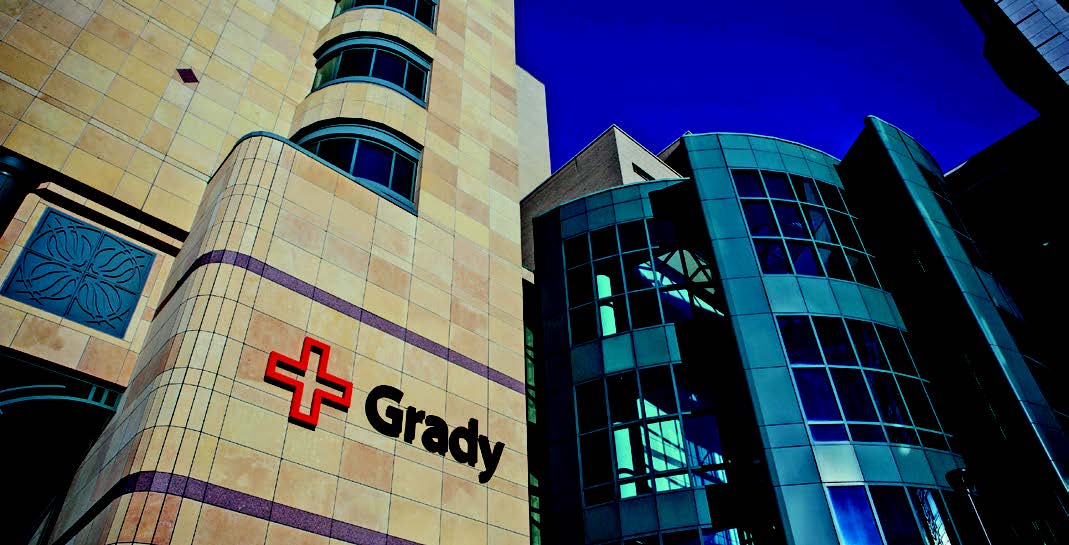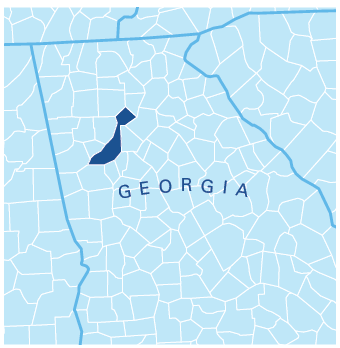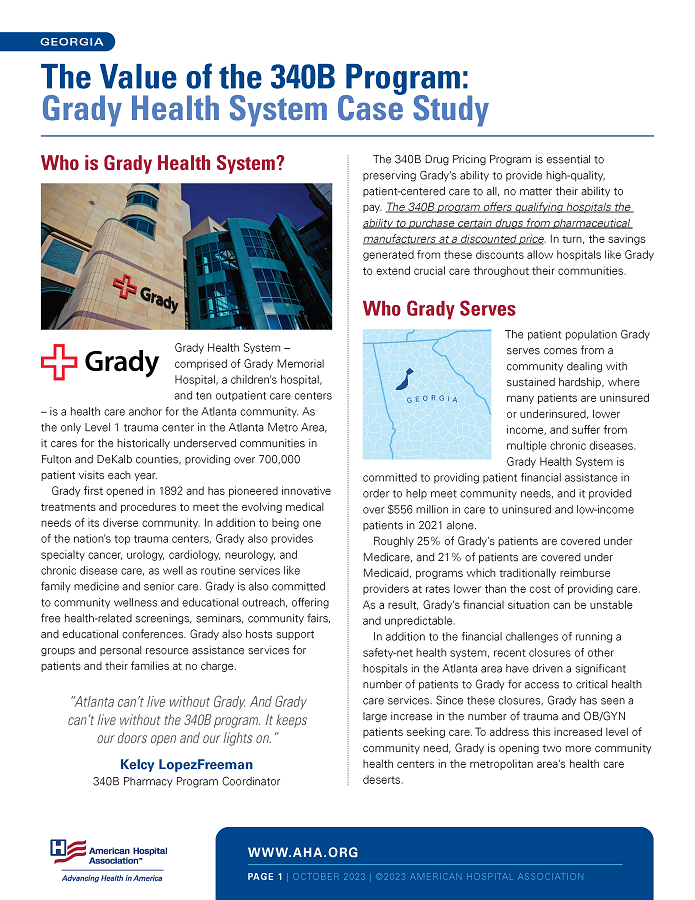

Grady Health System | Georgia
The Value of the 340B Program Case Study
Who is Providence Portland Medical Center?

 Grady Health System – comprised of Grady Memorial Hospital, a children’s hospital, and ten outpatient care centers – is a health care anchor for the Atlanta community. As the only Level 1 trauma center in the Atlanta Metro Area, it cares for the historically underserved communities in Fulton and DeKalb counties, providing over 700,000 patient visits each year.
Grady Health System – comprised of Grady Memorial Hospital, a children’s hospital, and ten outpatient care centers – is a health care anchor for the Atlanta community. As the only Level 1 trauma center in the Atlanta Metro Area, it cares for the historically underserved communities in Fulton and DeKalb counties, providing over 700,000 patient visits each year.
Grady first opened in 1892 and has pioneered innovative treatments and procedures to meet the evolving medical needs of its diverse community. In addition to being one of the nation’s top trauma centers, Grady also provides specialty cancer, urology, cardiology, neurology, and chronic disease care, as well as routine services like family medicine and senior care. Grady is also committed to community wellness and educational outreach, offering free health-related screenings, seminars, community fairs, and educational conferences. Grady also hosts support groups and personal resource assistance services for patients and their families at no charge.
The 340B Drug Pricing Program is essential to preserving Grady’s ability to provide high-quality, patient-centered care to all, no matter their ability to pay. The 340B program offers qualifying hospitals the ability to purchase certain drugs from pharmaceutical manufacturers at a discounted price. In turn, the savings generated from these discounts allow hospitals like Grady to extend crucial care throughout their communities.
“Atlanta can’t live without Grady. And Grady can’t live without the 340B program. It keeps our doors open and our lights on.”
Who Grady Serves
 The patient population Grady serves comes from a community dealing with sustained hardship, where many patients are uninsured or underinsured, lower income, and suffer from multiple chronic diseases. Grady Health System is committed to providing patient financial assistance in order to help meet community needs, and it provided over $556 million in care to uninsured and low-income patients in 2021 alone.
The patient population Grady serves comes from a community dealing with sustained hardship, where many patients are uninsured or underinsured, lower income, and suffer from multiple chronic diseases. Grady Health System is committed to providing patient financial assistance in order to help meet community needs, and it provided over $556 million in care to uninsured and low-income patients in 2021 alone.
Roughly 25% of Grady’s patients are covered under Medicare, and 21% of patients are covered under Medicaid, programs which traditionally reimburse providers at rates lower than the cost of providing care. As a result, Grady’s financial situation can be unstable and unpredictable.
In addition to the financial challenges of running a safety-net health system, recent closures of other hospitals in the Atlanta area have driven a significant number of patients to Grady for access to critical health care services. Since these closures, Grady has seen a large increase in the number of trauma and OB/GYN patients seeking care. To address this increased level of community need, Grady is opening two more community health centers in the metropolitan area’s health care deserts.
“The 340B program was created for hospitals just like Grady. We are the textbook example of a 340B hospital.”
The 340B Drug Pricing Program Directly Benefits Grady Patients
The 340B Drug Pricing Program helps to offset some of the costs associated with providing care to the underserved patient population that Grady serves. Without Grady, many patients would not get the medical care they need, meaning worsened health outcomes for the entire Atlanta Metro Area.
Lowering Prescription Costs
Thanks to the savings generated by the 340B program, no uninsured patient ever pays more than $5 for any formulary prescription at Grady pharmacies. This is critical for community members who cannot afford life-saving medications. Last year alone, Grady provided nearly 900,000 low-cost prescriptions to patients, some of whom were referred to Grady by other providers due to their financial situation. Grady can also deliver medications to patients, helping improve access for patients with limited transportation. Without the 340B program, Grady’s outpatient pharmacies that provide these affordable medications would not survive.
Patient Story Highlight
One patient diagnosed with diabetes came to Grady with extremely high A1C levels and high blood pressure. She needed five different medications but without insurance, it would cost over $800 to fill the two prescriptions for which she couldn’t get an affordable generic version. With such severe symptoms, she was out of work and feared losing her job if she couldn’t buy her medications. Luckily, this patient was referred to Grady, where she was able to get her remaining two medications for only $10, helping her recover and return to work!
Fighting HIV & AIDS
Grady is home to one of the nation’s largest, most comprehensive free-standing HIV/AIDS center, which is subsidized by 340B savings. With a PrEP pilot program that has prevented HIV infections in many patients, free testing, and access to medications, Grady is committed to providing HIV/AIDS care to all community members regardless of their insurance status. Through outreach efforts, Grady staff have boots on the ground at pride festivals and other community events to ensure patients know about the free services Grady provides.
Community Health Centers
340B savings have also enabled Grady to open seven neighborhood health centers in areas with significant community need. These community health centers provide important primary care services, helping to reduce health disparities and decrease the health equity gap across the Atlanta metro area. Without the savings generated by the 340B program, these outpatient locations would be forced to close in order to keep the hospital afloat.
340B Hospitals like Grady Need Support
Hospitals like Grady, which participates in the 340B program, are in a dire situation as they continue to face severe financial pressures. As labor and supply costs continue to rise and reimbursement from Medicare and Medicaid lag, it is increasingly difficult for hospitals like Grady – which are anchors in their communities – to maintain their robust services and ensure access to care for patients. As patient acuity and demand for care rise, especially as the country’s population continues to age, lawmakers must protect the 340B program to help hospitals like Grady offset the growing costs of providing care. The 340B program is under attack by some, and without it, many hospitals across the country may be forced to eliminate services, if not close their doors entirely. The federal government must protect the 340B Drug Pricing Program to protect the nation’s historically marginalized communities.


